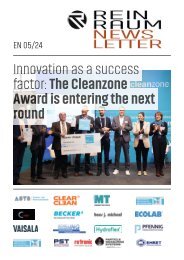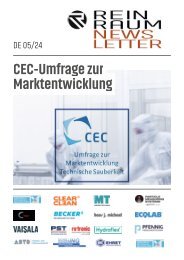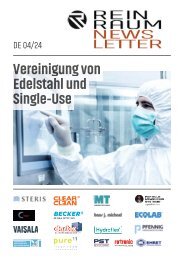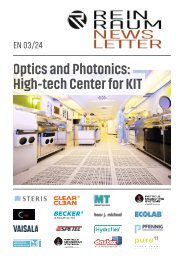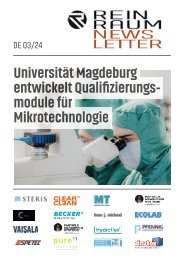Newsletter_04-2024_EN
Create successful ePaper yourself
Turn your PDF publications into a flip-book with our unique Google optimized e-Paper software.
Carl Zeiss Foundation Finances Establishment of Joint Facility
in Heidelberg, Karlsruhe, and Mainz
New Center for Synthetic Genomics
Applying and developing new technologies for DNA synthesis to pave the way
for producing entire artificial genomes – that is the goal of a new interdisciplinary
center that is being established at Heidelberg University, Karlsruhe Institute
of Technology (KIT), and Johannes Gutenberg University Mainz (JGU). The aim
of the Center for Synthetic Genomics is to spark new developments in synthetic
genomics through basic research and technology development using methods of
artificial intelligence. The Carl Zeiss Foundation (CZS) is financing the center’s
establishment over a period of six years with a total amount of twelve million
euros.
In the long term, it should be possible to design
and synthesize long DNA sequences for
applications in research, nanomaterials science,
and medicine. The first spokesperson
of the new center is systems biologist Professor
Michael Knop, Deputy Director of the
Center for Molecular Biology of Heidelberg
University (ZMBH).
While the past two decades of genome
research were marked by the development
of new genome sequencing techniques, it
will become possible to modify genomes
more quickly and easily, or even to create
entirely new genomes, using innovative
methods of DNA synthesis and genome assembly.
This is the vision that the Carl Zeiss
Foundation Center for Synthetic Genomics
Heidelberg – Karlsruhe – Mainz (CZS Center
SynGen) will pursue in the coming years.
The researchers from the three universities
want to design synthetic DNA sequences
with the aid of AI-based methods of analysis
and modeling in order to make targeted
modifications in the genome of organisms
and give it new functionalities. The aim is
to extract from them so-called biologics,
that is, biotechnologically manufactured
products. These are eventually to be used to
produce bio-based medicines, develop gene
therapies for diseases, breed pest-resistant
plants, produce biofuels, and advance research
into new types of materials.
“At the CZS Centers we consolidate
expertise across locations and disciplines.
The life sciences in particular require a high
degree of interdisciplinary collaboration. At
the CZS Center SynGen we aim to advance
the production of artificial DNA and tap
the immense potential for research, medicine,
and beyond,” says Carl Zeiss Foundation
Managing Director Dr. Felix Streiter,
explaining the motivation for funding the
f.l.t.r.: The three members of the Board of Directors Edward Lemke, Sylvia Erhardt, and
center spokesperson Michael Knop, as well as Phil-Alan Gärtig of the Carl Zeiss Foundation
(Photo: Uwe Anspach, Heidelberg University – Communications and Marketing)
second CZS Center in Germany.
“The Center for Synthetic Genomics
pools the expertise of three of the leading
research institutions, which are now jointly
working on an important future-oriented
field from basic research to technology development,“
says Professor Oliver Kraft, Acting
President of KIT. “Our aim is to achieve
a wide range of applications in biotechnology,
for example in medicine, but also in
materials science. We are very pleased to
contribute to this with our expertise.“
Synthetic Genomics
“Synthetic genomics is a young but rapidly
growing research area worldwide, with
transfer potential for different socially relevant
challenges. In our new center we will
pool the complementary expertise of the
three strong research universities at Heidelberg,
Karlsruhe, and Mainz in the life
sciences, molecular systems engineering,
and biomedical research. That way, we intend
to coordinate all the steps in synthetic
genomics, from design and production right
up to the application of synthetic genetic
materials and organisms,” says Center Spokesperson
Michael Knop. “The new center
will provide us with a unique opportunity
to combine different areas of expertise and
disciplines in a new way. Particularly the
discourse of biology and medicine with experts
in simulation and modeling will show
us new ways not only to generate synthetic
genomes, but also to better understand
and use natural and artificial modifications
and epigenetic mechanisms,“ Professor
Sylvia Erhardt explains. The molecular biologist
of Karlsruhe Institute of Technology
is a member of the CZS Center SynGen‘s
three-member Board of Directors alongside
Professor Michael Knop and biophysical
chemist Professor Edward Lemke of Mainz
University.
The Carl Zeiss Foundation Center for
Synthetic Genomics Heidelberg – Karlsruhe
– Mainz started work in January 2024.
Researchers collaborating at the three locations
represent different disciplines, including
biology, biochemistry, biophysics,
www.reinraum.de | www.cleanroom-online.com NEWSLETTER | Edition EN 04-2024
page 24/35










